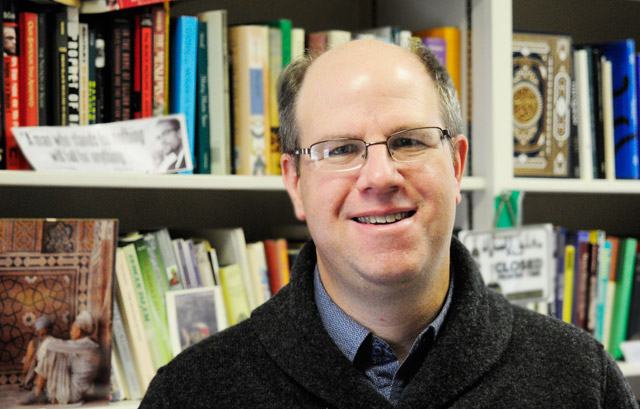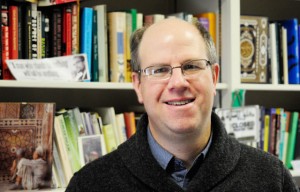Gottschalk to Develop Course on “The Sacred” with NEH Grant


Professor of Religion Peter Gottschalk has been awarded a National Endowment for the Humanities “Enduring Questions” grant for approximately $20,000 to develop and teach a new course on different understandings of “the sacred.”
Over the last five annual competitions, this competitive grant program received approximately 200 applications each year on average, and funded only 19 awards each year.
The course Gottschalk develops will be open to all Wesleyan undergraduates, though he may teach one iteration as a First Year Seminar. It will consider four themes— sacred places, invoking the sacred, sacred bodies, and the sacred nation—to study how different Hindu, Lakota, Jewish, Christian, Muslim and secular communities have considered certain places, times, and people to stand apart, appear different, or seem energized in some special manner. The class will also look at how the views of these places, times, and people can change over time.
“When discussing religion, Americans commonly make reference to ‘the sacred’ as though everyone knows what that means,” said Gottschalk. “People routinely describe certain places or times as sacred, and sometimes even particular ideas. Some uses of the term challenge the distinctions between ‘the religious’ and ‘the secular’ that many of us presume to be so obvious. Indeed, Jefferson’s original wording for the Declaration of Independence was that ‘We hold these truths to be sacred and undeniable’ while Lincoln declared the Gettysburg battlefield ‘consecrated’ by those who fought and died there. Meanwhile, scholars occasionally use the term when describing religious communities without questioning whether or not any equivalent term exists among those communities, and what differences in terminology may reflect about differences in worldviews.”
Gottschalk plans to spend next summer developing the first iteration of the seminar, and the following summer using lessons learned from the first offering to improve the second iteration.
“A good part of the initial development will involve the creation of a publicly available website allowing users to virtually investigate various sites,” he explained. “This reflects a pedagogical innovation I’m developing in seminars this semester by which students explore certain topics and sites through images and texts photographed on location and posted online. They engage these treks at home in preparation for the next seminar, and then we discuss their observations and conclusions.”
According to Gottschalk, the grant will help cover the costs of visiting Gettysburg and Ground Zero, for inclusion of images on the website. It will also pay for the seminar’s visits to a Catholic church and Hindu temple in Middletown, as well as a Muslim mosque in nearby Berlin, Conn. for interviews with community members and observations of how these architectural spaces reflect notions pertinent to the course. Gottschalk will also use the grant to add to the library’s holdings of electronic and printed books.
In the future, Gottschalk may develop the course into seminars for Wesleyan’s Graduate Liberal Studies Program and the Center for Prison Education.

